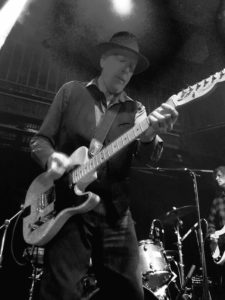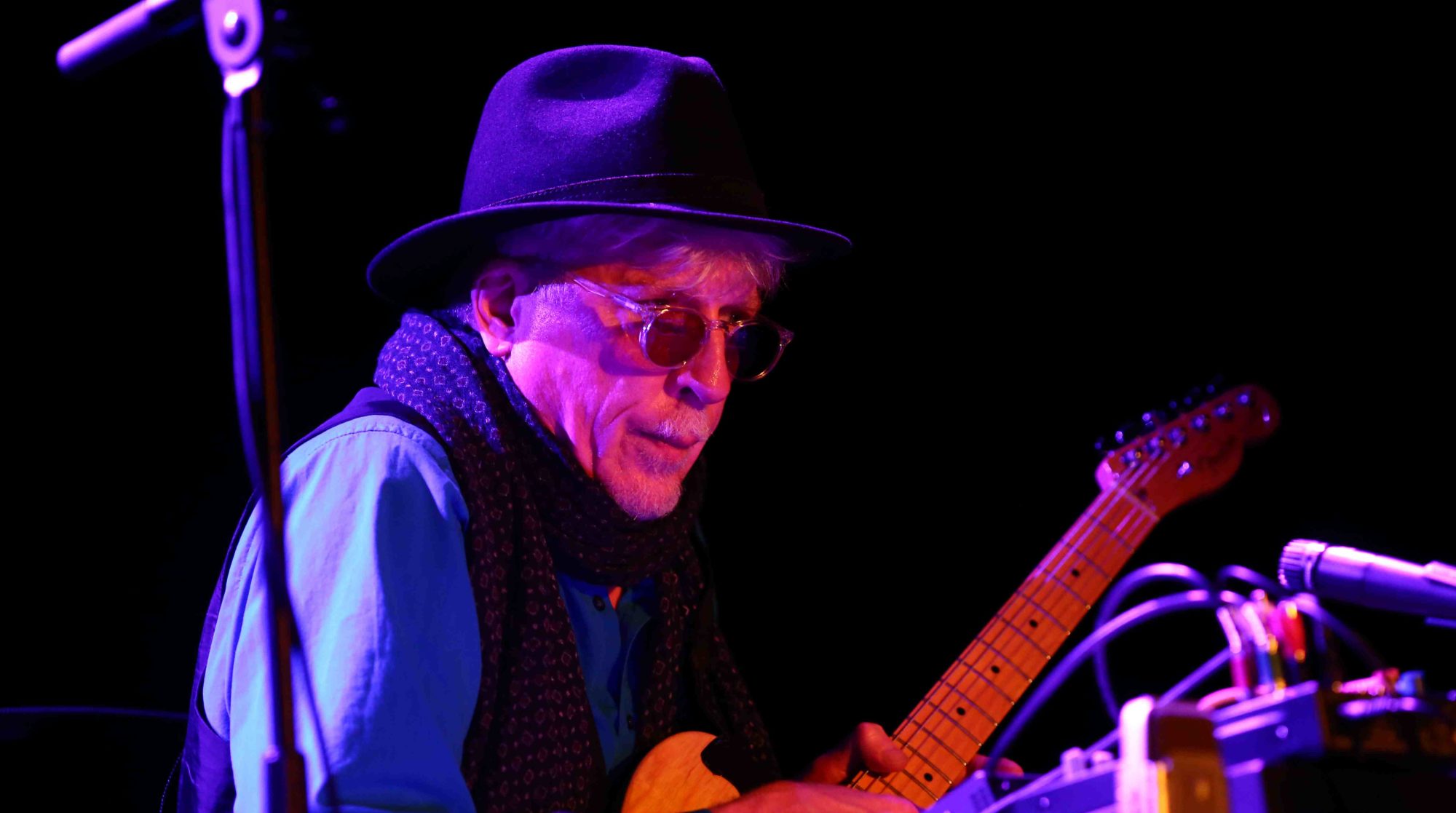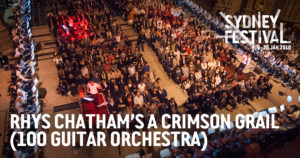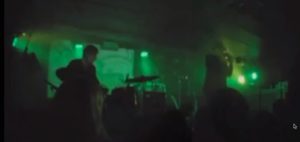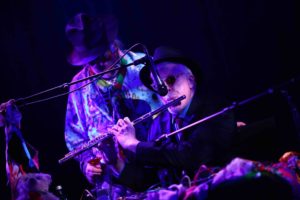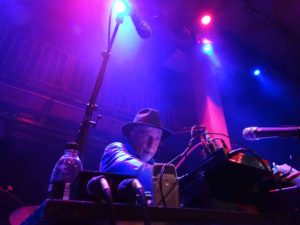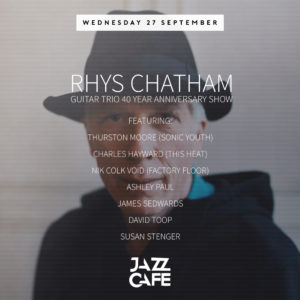Here is a link to a fabulous review of the Pythagorean Dream concert at the Freakout Club in Bologna from last week. It was written by Massimiliano Speri and it’s quite amusing, in addition to accurately describing the ambience of the concert (in my view).
http://www.ondarock.it/livereport/2017-rhyschatham.htm
It’s in Italian. English translation below:
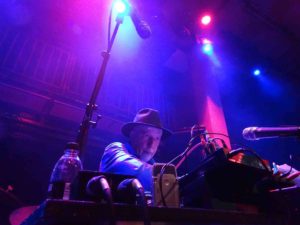
Ondarock / live report / Rhys Chatham
30/09/2017
Rhys Chatham
Freakout, Bologna
by Massimiliano Speri
How to categorize a historically liminal and artistically hybrid figure like Rhys Chatham? The last of the New York minimalists or the first of Noisers no wave? Perhaps, along with his friend and accomplice Glenn Branca, it is the conjunction ring between the two universes. But there is another thing: in his almost priestly vocation for deafening avant-garde sonic performances (his drone sonata for hundreds of guitar ensembles, immortalized in the monumental “A Crimson Grail”), the now-nationalized Parisian composer is in the end, yet another happy product of that all-American tendency for the conceptual-performative gesamtkunstwerk, a contemporary abstractism without frame or caption boundaries, although more suitable to favor mystical ascent than to sound art galleries.
After the pleasing opening for the solo guitar of Bolognese JH Guraj (delightful american primitivism lying and pastoral, perhaps closer to the disciple Jim O’Rourke than to the master John Fahey), Professor Chatham comes on stage in a Mass at Burroughs / Tom Waits, makes a quick set-up of the complex equipment on the table in front of him and, with scientific discovery, presents himself, his high credentials (throwing here and there the names of Charlemagne Palestine, Steve Reich and Tony Conrad as if they had collaborated it was the world’s most deserved thing) and the recipe that’s about to propose to us: it explains that his usual orchestral armies would be too complicated to take on tour, so he decided to submit himself by presenting himself with loops with a clever game of delays to replicate the stratified rationale of his most extreme experiments; it will be a single, long suite in several parts, and the raw material of each act will be provided by a trumpet, a flute and, of course, an electric guitar; It even tells us the duration of the performance: about 55 minutes. He speaks in a quiet voice and is marked by an adorable yankee partially frantic accent, is relaxed and playful with the public, resembles more a grandfather who wants to entertain his grandchildren than an intellectual intent on épater le bourgeois. After all, we are not talking about a nihilistic rocker but a serious composer, formed in a classical setting as a harpsichord accordion, and then converted to the trial at LaMonte Young, who in the avant-punk arena moved from free beater.
It begins with an overlapping overhang of loud trumpet notes, which seem to flutter in the venue like stunned mosquitos, bouncing between the heads of the already hypnotized spectators. The sound is deliberately dirty and creates a frothy amalgam, which could recall the metaphysical layers of Jon Hassell if he did not evoke a whole urban neurosis in the lines. The second layer provides the Telecaster which, thanks to the open arrangement (“in D minor 7”, the Maestro specifies for us), creates that typical resonance, slightly dissonant, so dear to a lot of psychedelia as well as some work by colleague Terry Riley. After spreading the base of the cake with a velvety bunion garnished with scavenging arpeggios, gives the second pass with a sprinkling of more acute notes, a cobweb of small trills, and stretches the broth with liquid E-bow streaks. The resultant wall of sound is such an icastic and magmatic immobility to sink into trance, a hallucination to be taken religiously seriously. Then touches on the flute, the first instrument approached by young Rhys, here to create long, deep, pasty notes, as if a church organ was played in a rainforest. Depending on moods, this atmospheric ocean can communicate extreme relaxation or extreme tension, if not even the two things simultaneously. Finally, you return to a monotone lament in unison for guitar and voice, the ritual song with which a monk wakes up at dawn the rest of the monastery. The audience is enchanted, now completely taken by both the skill of the magician and the evocative power of the operator.
While the last notes suspended begin to blend with the intrusive delicacy with which they have taken hold of our heads and bodies, Rhys stands up and bows, jokingly excitedly for managing to play the piece within the predicted time duration (54 minutes and 33 seconds) which only went overtime by a few minutes. Then, like a pastor of the past, he sits on stage and invites those interested to reach him for a chat or an autograph: definitely not the typical serious image that tends to associate with an experimental composer …
Chatham’s avant-garde is icy and mystical, algebraic and elusive, rigorous and occult. And the key to decrypt it is perhaps in the title of his last work, “Pythagorean Dream,” from which the performance of the evening takes abundantly the moves: what expression can be more effective than that “pythagorean dream”, to describe this esoteric alchemy of technique and suggestion?
Leaving the Freakout, I start home through the steel and concrete roads of San Donato, Bologna’s most “industrial” neighborhood: perhaps, a scenario not so different from the New York lowlands where this metropolitan shaman began to theorize its fascinating pan-ethnic assault to contemporary music …
—ooOoo—
